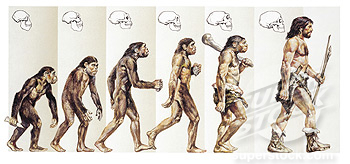I had accepted the evolutionary story since elementary school. I think I accepted it after seeing diagrams like
 and visiting the Air and Space Museum and learning of our supposed origins. I didn’t find the story revolting. I found it kind of cool we were evolving and getting better and better.
and visiting the Air and Space Museum and learning of our supposed origins. I didn’t find the story revolting. I found it kind of cool we were evolving and getting better and better.
But as a freshman in high school, I began to doubt evolution when I considered the problem of consciousness. I remember sitting in class and the biology teacher gave the standard talking points. But for some reason, the fact I was conscious did not seem reducible to evolutionary explanations. Strange that I would even be perplexed about it as a high school student, but I was. That was the beginning of my doubts about Darwin…
Years later, when I related the story to Walter ReMine, he explained to me consciousness poses a serious problem for evolution.
He said something to the effect, “Say an animal has to flee a predator — all it has to do is run away. Why does it have to evolve consciousness in order to flee predators?” Mechanically speaking the animal can be programmed to flee or even hunt without having to be self-aware. Why does it have to evolve consciousness to do anything for survival?
Why would selection favor the evolution of consciousness? How does selection select for the pre-cursors of consciousness? I don’t think it can. Ergo, consciousness didn’t evolve, or it’s just a maladaptation, or an illusion — or maybe it is created by God. Materialists can say consciousness is an illusion all they want, but once upon a time, when my arm was broken in a hang gliding crash, I felt real pain. It would have been nice if consciousness were an illusion back then, it wasn’t. Even with the questions of split-brain patients, something tells me that even if my consciousness had been split, there would still be a conscious entity feeling the pain from that shattered arm.
If we consider the two cells (one from the mother and the other from the father) that conceive a human, are those cells conscious, sentient beings? Most will say they are not. But then these cells join and somewhere along the way, a conscious being emerges from a mechanical process? Something seems wrong with this picture. Something seems paradoxical. How can a purely mechanical process create consciousness?
One way the paradox is resolved is to assume consciousness is more fundamental than matter and energy. That is the view of some physicists. Shockingly, the journal Nature allowed such a bold proposal in its prestigious pages:
The 1925 discovery of quantum mechanics solved the problem of the Universe’s nature. Bright physicists were again led to believe the unbelievable — this time, that the Universe is mental.
…
According to Sir James Jeans: “the stream of knowledge is heading towards a non-mechanical reality; the Universe begins to look more like a great thought than like a great machine. Mind no longer appears to be an accidental intruder into the realm of matter…we ought rather hail it as the creator and governor of the realm of matter.”
….
The Universe is immaterial — mental and spiritual.Richard Conn Henry
The Mental Universe: Nature Volume 436The Quantum Enigma of Consciousness and the Identity of the Designer
I suppose we cannot formally prove that view, but I sympathize with it, I accept it as true — if consciousness exists, it is in a separate realm than the mechanical, material universe.
Can a Darwinist explain how selection selects for the pre-cursors of consciousness? Can a computer engineer say what number of bits is needed to implement it? I don’t think so. Logically it seems to transcend pure materialism (matter and energy). It is reassuring some physicists share this view as well. MIND and spirit, more than matter and energy, could well be the ultimate reality.
Photo credits superstock